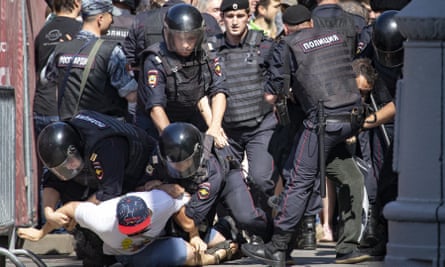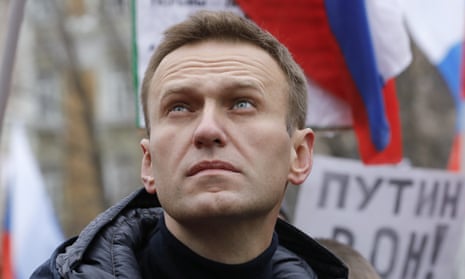Russian opposition politician Alexei Navalny has been hospitalised, with symptoms that one of his doctors said appeared to be “the result of harmful effects of undefined chemical substances”.
Navalny was taken to hospital on Sunday morning from jail, where he was serving a 30-day sentence after being arrested last week for calling people to attend an anti-government protest.
The protest went ahead on Saturday, and prompted the most forceful police response to protests in the country for years, with more than 1,300 people detained by officers.
People were protesting against the refusal of electoral authorities to register independent candidates for the Moscow city council elections in September.
Although there was no sign that his life is in immediate danger, the news about Navalny’s health will cause alarm, in a country where opposition politician Boris Nemtsov was shot dead outside the Kremlin in 2015.
On Sunday morning, Navalny’s spokeswoman, Kira Yarmysh, said he had suffered a “severe allergic reaction”, and added that he had never complained of allergies before. She said Navalny had suffered “severe swelling of the face and skin redness”.
On Sunday afternoon, Navalny associate Leonid Volkov said he was not minded to see foul play in Navalny’s condition, saying he had been held in exactly the same cell last month and also suffered a skin rash, citing poor sanitary conditions in the jail.
However later on Sunday, Anastasia Vasilieva, one of Navalny’s doctors, wrote in a Facebook post that she and a colleague had visited Navalny in hospital, and had first been denied access but were eventually able to examine him.

An ophthalmologist, who treated Navalny after he was doused with green dye by pro-Kremlin activists in 2017 in an attack that left him temporarily blind in one eye, Vasilieva said it was clear Navalny was not suffering from an allergy but from exposure to toxic substances.
“We cannot exclude toxic damage to the skin by chemicals induced by a ‘third person’,” she wrote. She called on the hospital administration to immediately allow proper medical care for Navalny. The hospital has not yet made an official statement.
Police detained at least 10 of Navalny’s supporters who had gathered outside the hospital late on Sunday evening, according to a correspondent for Russia’s TV Rain.
Several other opposition politicians remain in jail, held on the charge of “obstructing the work of the electoral commission”, and police have carried out late-night searches of their homes in recent days.
Most of the more than 1,300 protesters detained on Saturday were released without charge, but more than 150 spent the night in police stations and may face court cases this week. An independent monitoring group said at least 25 people sustained injuries at the hands of police.
Saturday’s protest came a week after more than 20,000 people rallied in central Moscow to protest against the decision to ban the candidates from standing in September’s local vote, on what the opposition says is the invented pretext that some of the signatures collected to support their candidacies were faked.
The turnout shocked authorities, prompting them to arrest Navalny and declare this weekend’s protest illegal.
On Saturday morning, Moscow mayor Sergei Sobyanin warned people that they could face arrest if they tried to protest, and riot police had clearly been given orders to move forcefully against the demonstrators. Large areas of the centre were cordoned off, and police used rough tactics and batons to detain protesters despite their action remaining peaceful.
Natalia Zviagina, of Amnesty International, said the violent response to the protest was a “new low” for Russian authorities and called on police to release all of those detained. “No one should be imprisoned for merely exercising their rights to expression and peaceful assembly,” she said.
Opposition leaders have said they will call another protest for this coming Saturday, 3 August, in an attempt to keep up the pressure on authorities.
Russian president Vladimir Putin, who on Saturday descended in a miniature submarine to inspect the wreck of a second world war submarine, had not commented on the protests or the arrests as of Sunday. State TV has also largely ignored the unrest, but millions of Russians watched live streams of Saturday’s events on YouTube.
